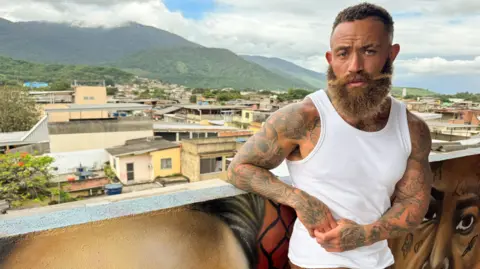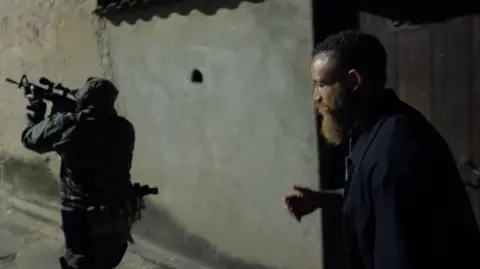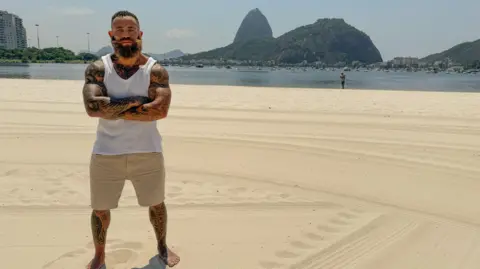Ashley Cain's 'shocking' experience in the Brazilian favelas
 BBC/True North
BBC/True NorthAshley Cain visited dangerous places around the world - and tried to understand why some young men choose a life of crime.
"It's absolutely devastating. People are losing their lives every single day," says Cain about the impact of crime in some of the world's most hostile environments.
In his new BBC series, the ex-professional footballer speaks to young men involved in criminality, from favelas in Brazil to gangs in Sweden. And he also explores other topics like rhino poaching in South Africa and illegal gold mining in Colombia.
He wanted to understand why they had chosen a life of crime, its "heartbreaking" impact on people and how some were finding a way out.
 BBC/True North
BBC/True NorthCain recalls meeting one mother in a favela in Rio de Janeiro, whose two children had been murdered.
"It hit me deeply," he says. "To find out how she picked her son up in nothing but a bag of bones from one of the cartels was devastating."
The presenter, who has faced the loss of his own child, says he hoped "in that moment, just to make this lady feel comforted, feel heard and feel like she had a voice to speak about all that's wrong in that area".
Favelas are informal settlements and there are more than 1,000 in Rio de Janeiro.
Cain shares his shock walking into one favela and seeing people openly selling drugs or walking around with guns "like it was normal".
"Criminality is around these guys," he says, explaining that they get picked up off the street and promised they're going to be looked after. "In the end, they always end up in the same place, unfortunately."
He adds that many of the people he met were not happy. "They don't enjoy doing what they're doing, they're scared, they're worried, they're in pain," he says.
Fearing for my life
 BBC/True North
BBC/True NorthCain travelled to different favelas, including to one where documentary crews had never been allowed to film.
He spoke to masked men selling drugs out in the open and carrying large weapons - they explained that teenagers as young as 13 had sometimes become involved in criminal activity in the favela.
When asked by Cain why they don't choose other ways to make money, one man talked about the lack of jobs in the area.
However, Cain says it was "really shocking" to speak to an armed young man working for a cartel who was from a "relatively middle-class" background.
"I'm thinking, you're risking your life every single day because of what you believe to be perceived as a good thing, as a cool thing," he says.
Cain notes that for many in favelas it is a "reality to see and hear bullets flying every single day".
'A much safer life'
Cain also spoke to young men looking for other options.
He remembers meeting one man running a music enterprise, trying to get young men out of gangs by providing them opportunities to DJ and "teaching them skills to allow them to live a much more prosperous and safer life".
Cain also met a young man at a cocktail-making class from a favela who had previously been shot - but was now choosing to learn new skills.
"That shows with the right support, with initiatives and with people that are trying to make a difference in these communities, you can save lives," he says.
The main thing Cain says he took away from speaking to these young men was to be there to listen to his sons and to "lead by example [to] be the kind of man that I would enjoy to see my sons being".
Cain says he hopes the series encourages people to talk to their children.
"Somebody might be sitting next to their young son, who's the same age as some of these guys here wielding weapons, and just think, 'maybe I need to pay more attention, maybe I need to pay more time, maybe I need to listen more.'"
